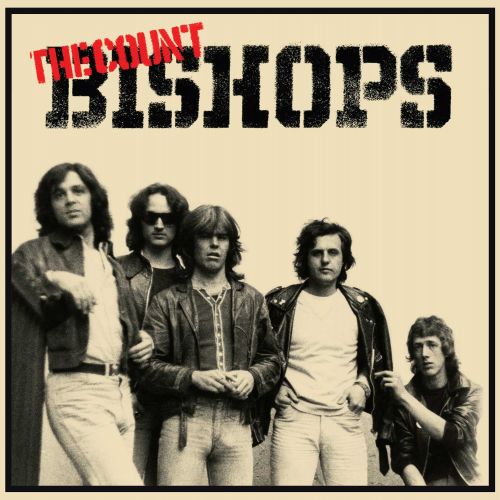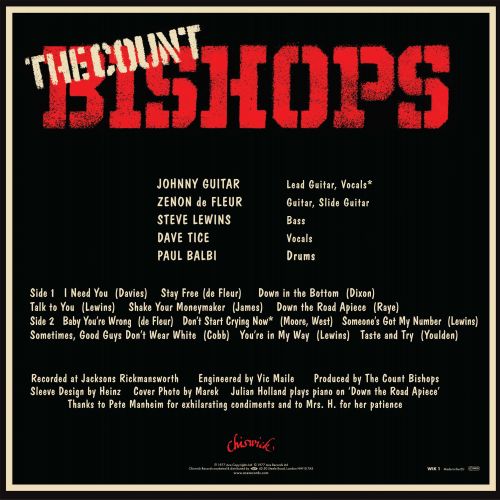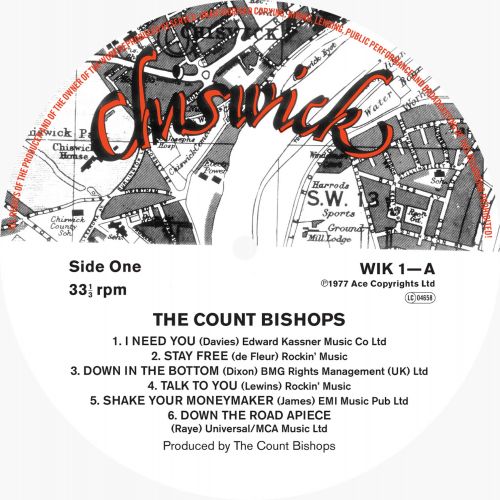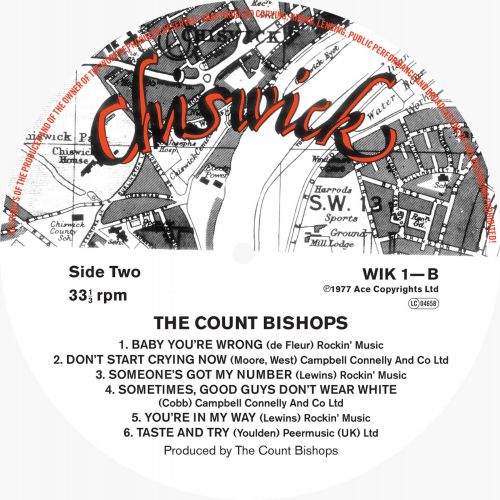CULT CLASSIC: THE COUNT BISHOPS-THE COUNT BISHOPS.
Cult Classic: The Count Bishops-The Count Bishops.
During 1977, a genre that has continued to divide opinion was at the peak of its popularity, punk. This anti music was championed by critics and cultural commentators who were willing to overlook that many of the musical charlatans within punk bands could barely play their instruments and were musically illiterate. Music had changed the critics said, and many thought not for the better.
Despite this, DJs championed the latest punk singles on their late-night radio shows and waxed lyrical about the new genre. This was, they said the future of music.
Punk, its champions explained, was about rejecting the supposed excesses of seventies mainstream music and embracing and adopting a DIY ethos. Many punk singles were released on newly founded independent labels that sprung up across the country.
The singles were fast, edgy and featured arrangements that were pared back with lyrics were full of anger, angst and frustration. Thankfully, many of the singles were also short as these chippy class warriors ran out of things to say after a couple of minutes.
Many of these singles turned out to be one-offs and the bands sank without trace. Some punk bands enjoyed a degree of success and went on to enjoy a degree of longevity.
Meanwhile, in 1977, an eclectic selection of talented bands were playing live and releasing albums that deserved to find a much wider audience. This included The Count Bishops, who released their eponymous album on the Chiswick label in 1977. However, the story began two years earlier.
It was London, in the spring of 1975, when The Count Bishops were formed when members of the group Chrome joined forces with American vocalist Mike Spenser. The group combined elements of blues, R&B and rock. They were also influenced by sixties garage rock and the seventies pub rock scene. These influences would feature when the group played live.
By July 1977, the line of The Count Bishops had changed. The group were in Paris when Mike Spenser place the first in a series of transatlantic calls to Johnny Guitar. After some persuading, the American guitarist packed two Les Pauls and flew to Britain.
That was where Johnny Guitar was reunited with Mike Spenser who introduced him to guitarist Zenon DeFleur. He had been given the name after being discovered passed out on the floor during the group’s first recording session.
It took a few weeks for the three members of the band to recruit a new rhythm section. Drummer Paul Balbi and bassist Steve Lewins joined The Count Bishops and the following month, the new lineup made entered the studio for the first time.
The group were joined at Pathway Studios by engineer Barry Farmer. They recorded a total of thirteen tracks and four were chosen to feature on the group’s debut EP.
Route 66, I Ain’t Got You, Beautiful Delilah and Teenage Letter featured on The Count Bishops’ Speedball EP. It was released by Chiswick Records in 1975, and featured elements of garage rock, pub rock, R&B and rock ’n’ roll. Sadly, the EP wasn’t a commercial success and it was another year before the group released a single.
This was Train, Train which was released in 1976 by Chiswick Records. However, just before the release of the single Mike Spenser left the band. It’s alleged that this was because of incident involving a glass door and the singer’s boot.
Having lost their vocalist, Johnny Guitar and Zenon DeFleur shared lead vocal duties during part of 1977. This arrangement was only temporary.
Before the group recorded their eponymous album, The Count Bishops, they decided to recruit a new vocalist. This was Australian Dave Tice who previously, had been a member of Buffalo. He would feature on most of the songs on the album.
Twelve tracks were chosen, and were a mixture of covers and new songs. Zenon De Fleur penned Stay Free and Baby You’re Wrong while Steve Lewins contributed Talk To You, Someone’s Got My Number and You’re In My Way. Covers included the Ray Davies’ composition I Need You, Willie Dixon’s Down In The Bottom, Elmore James’ Shake Your Moneymaker, Don Raye’s Down The Road Apiece, Ed Cobb’s Good Guys Don’t Wear White and Taste and Try which was written by British blues rock singer Chris Youlden. The other track on the album was a cover of the blues Don’t Start Crying Now which was written by Slim Harpo with producer JD Miller.
The Count Bishops were once again a five piece band and headed to Jackson Studios to record their eponymous album. It featured a rhythm section of drummer Paul Balbi and bassist Steve Lewins. Zenon DeFleur switched between guitar and slide guitar. Johnny Guitar was the group’s lead guitarist and took charge of the vocal on Don’t Start Crying Now. Meanwhile, new recruit David Tice made his debut as vocalist. Making a guest appearance on Down The Road Apiece was pianist Julian Holland. Just like the single Train, Train, the group produced the album which was engineered by Vic Maile.
The result was The Count Bishops which featured the London-based band at their tightest on an album that’s a mixture of original material as well as covers of blues and tracks from the sixties that also inspired the band. They were fans of sixties beat music so it was fitting that a cover of The Kinks’ I Need You opened the album. This set the bar high.
Over the next eleven tracks, the group never miss a beat as they combine elements of blues, pub rock, R&B and rock ’n’ roll during a series of driving, energetic and sometime raucous, riotous and rollicking, fist pumping, good time music that was honed in the bars and clubs of London. The Count Bishops was an album that should’ve introduced the group’s music to a much wider audience.
Sadly, that wasn’t the case, and The Count Bishops wasn’t a commercial success when it was released in 1977. Nor was the single Baby You’re Wrong when it was released later that year. It was a huge disappointment for a truly talented group.
Despite the disappointment, The Count Bishops returned in 1978 with the album Live. It was a tantalising taste of the band when they played live.
During 1978, The Count Bishops also released two singles, I Take What I Want and I Want Candy. This led to an appearance on the British television show Top Of The Pops. It looked as if the London-based band were about to make a breakthrough.
Meanwhile, the group were recording their next studio album studio album Cross Cuts. By then, bassist Steve Lewins had been replaced by Pat McMullan and Ruan O’Lochlainn was drafted in to add horns. The album took eighteen months to complete and was meant to be band’s breakthrough album. It was eventually released in March 1979. Just a few days later tragedy struck for The Count Bishops.
On the ‘18th’ March 1979, Zenon DeFleur died when he crashed his Aston Martin which he had lovingly restored. It was a devastating blow for his family, friends and The Count Bishops.
Sadly, the anticipated breakthrough never happened Zenon DeFleur’s death.
Despite that, The Count Bishops headed out on tour with Blitz Krieg of Blast Furnace deputising on guitar.
Not long after this, the group were looking for a new drummer when Paul Balbi was deported back to Spain.
The Count Bishops recruited Charlie Morgan who had played with Elton John and the Tom Robinson Band on drums. This was only temporary arrangement but the group continued to tour and even toured Australia.
This meant that former drummer Paul Balbi was able to rejoin the group albeit only for their Australian tour.
In 1980, The Count Bishops split-up having never reached the heights that they should’ve. It was a case of what might have been for the London-based band. who were at the peak of their powers on their 1977 eponymous album which is now considered to be their finest hour and is belatedly is now finding the wider audience it so richly deserves.
Cult Classic: The Count Bishops-The Count Bishops.
- Posted in: Blues ♦ Garage ♦ R&B ♦ Rock ♦ Rock 'n' Roll
- Tagged: Ace Records, Chiswick, Dave Tice, Johnny Guitar, Paul Balbi, Steve Lewins, The Count Bishops, Vic Maile, Zenon DeFleur



